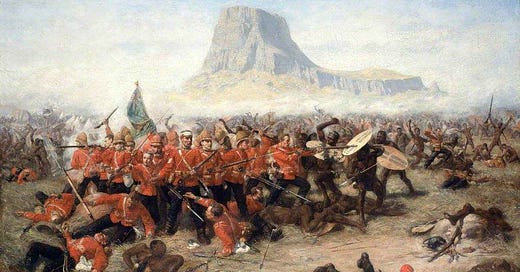In 1892, Sir Henry Newbolt published Vitaï Lampeda (“the lamp of life.”) In the century that followed, this poem found much employment as a means of explaining the relationship between the experience of life at an English public school and the ethos of the British officer of the Victorian Age.
The second of the three stanzas of the poem, which often serves as a stand-in for the whole, tells the tale of the application, on active service, of habits acquired on the cricket pitch.
The sand of the desert is sodden red,
Red with the wreck of a square that broke;
The Gatling's jammed and the colonel dead,
And the regiment blind with dust and smoke.
The river of death has brimmed his banks,
And England's far, and Honour a name,
But the voice of schoolboy rallies the ranks,
"Play up! play up! and play the game!"
So much time has passed since the debut of Vitaï Lampeda that I fear that twenty-first century readers will find it hard to understand. I have therefore translated the aforementioned bit of verse in a way that reflect both the language and the values of the present-day Pentagon.
The sand of Formosa is sodden red,
Red with the wreck of a Rainbow force;
The wi-fi's jammed and the colonel dead,
(Xir aced the white fragility course).
Our once carbon-neutral, now smoldering tanks,
Smoke and burn in ways so strange,
While the voice of a trannie reminds the ranks,
"Our greatest foe is climate change!"






The sad part, is I can see this happening, and the pentagone wondering what the hell happened to their precious rainbow brigade.
A number of years ago I was asked to speak to a group of Marine recruit poolees (and some parents) and I told the group that their ultimate purpose was to "close with and destroy the enemy through fire and maneuver." Some of the mothers were aghast, saying "Oh no, my son is going to be a radio operator." My response was, "yes, he will call for artillery to rain down death and destruction upon the enemy." I was "uninvited" to speak again.